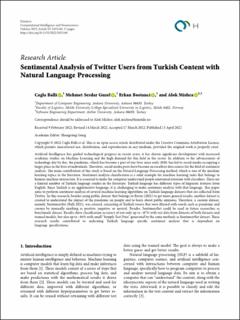| dc.description.abstract | Artificial Intelligence has guided technological progress in recent years; it has shown significant development with increased academic studies on Machine Learning and the high demand for this field in the sector. In addition to the advancement of technology day by day, the pandemic, which has become a part of our lives since early 2020, has led to social media occupying a larger place in the lives of individuals. Therefore, social media posts have become an excellent data source for the field of sentiment analysis. The main contribution of this study is based on the Natural Language Processing method, which is one of the machine learning topics in the literature. Sentiment analysis classification is a solid example for machine learning tasks that belongs to human-machine interaction. It is essential to make the computer understand people emotional situation with classifiers. There are a limited number of Turkish language studies in the literature. Turkish language has different types of linguistic features from English. Since Turkish is an agglutinative language, it is challenging to make sentiment analysis with that language. This paper aims to perform sentiment analysis of several machine learning algorithms on Turkish language datasets that are collected from Twitter. In this research, besides using public dataset that belongs to Beyaz (2021) to get more general results, another dataset is created to understand the impact of the pandemic on people and to learn about public opinions. Therefore, a custom dataset, namely, SentimentSet (Balli 2021), was created, consisting of Turkish tweets that were filtered with words such as pandemic and corona by manually marking as positive, negative, or neutral. Besides, SentimentSet could be used in future researches as benchmark dataset. Results show classification accuracy of not only up to ∼87% with test data from datasets of both datasets and trained models, but also up to ∼84% with small “Sample Test Data” generated by the same methods as SentimentSet dataset. These research results contributed to indicating Turkish language specific sentiment analysis that is dependent on language specifications. | en_US |

